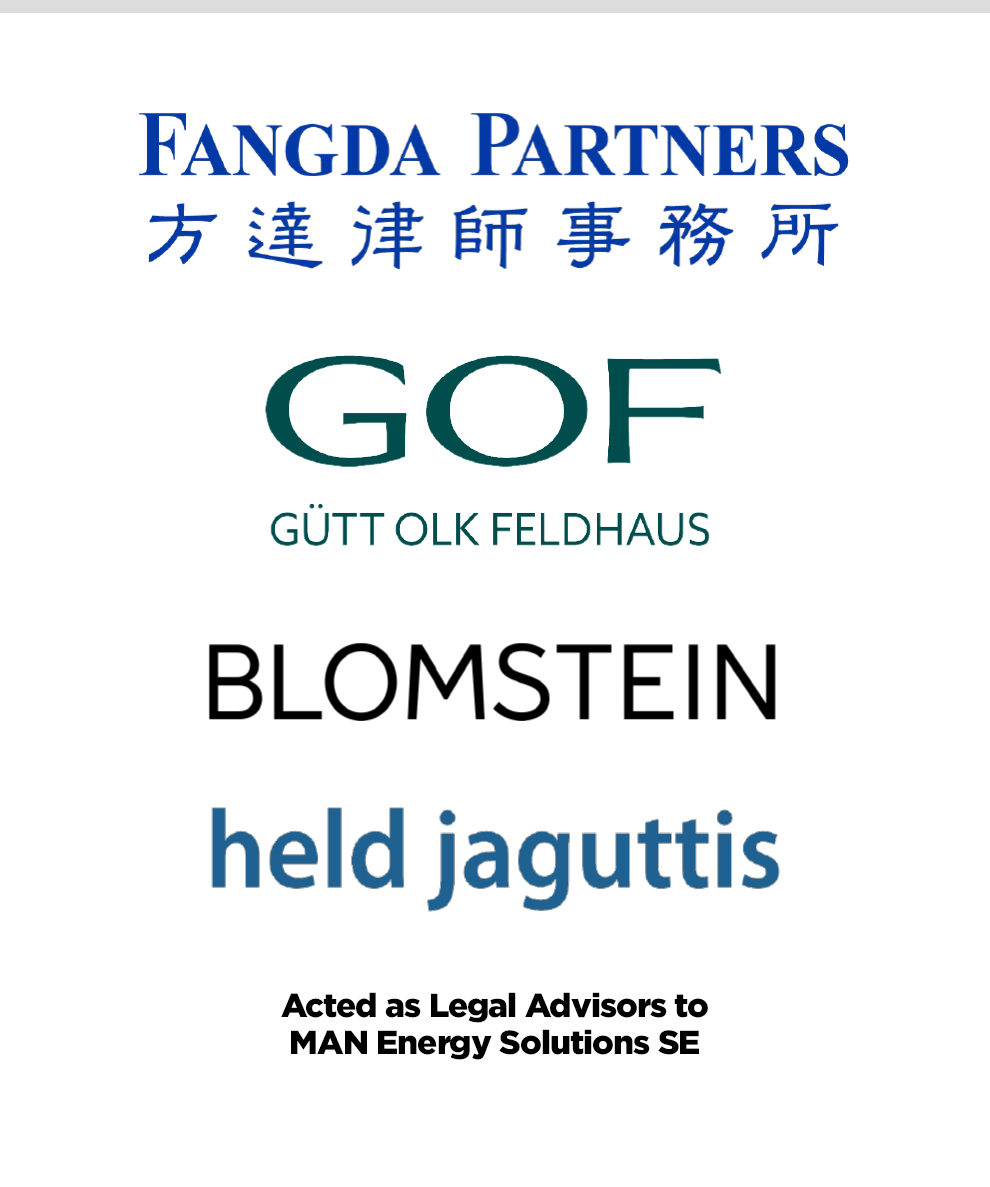Gütt Olk Feldhaus, Blomstein and held jaguttis also advised MAN Energy Solutions.
The transaction, which remains subject to regulatory approval and various closing conditions, comes alongside the conclusion of long-term supply and service agreements between the two companies, setting the stage for close cooperation in the future. The parties agreed not to disclose the purchase price.
MAN Energy Solutions is an Augsburg-based supplier of large diesel and gas engines and turbomachinery. Boasting a team of around 14,000 employees across more than 120 worldwide locations, the company’s product portfolio includes two and four-stroke engines for maritime and stationary applications, turbochargers and propellers as well as gas and steam turbines, compressors and chemical reactors.
GHGT is based in Harbin, China, and is a subsidiary of the China State Shipbuilding Corporation (CSSC) with more than 700 employees worldwide. The company develops small and medium-sized gas turbines as well as high-performance and combustion technologies.
Fangda Partners advised MAN Energy Solutions on Chinese law aspects with a team led by partner Jack Li.

Lawyer Monthly had the pleasure to speak with Jack Li at Fangda Partners to give us some further insight into this transaction:
Can you give us some background into this sale and how it came about?
This sale is a natural move for MAN Energy Solutions as part of its ’Performance 2023‘ program launched in 2020 to adjust its product portfolio. After the sale, MAN will strengthen its focus on large-scale solutions for decarbonisation and climate protection. For GHGT, the existing MGT gas turbine centres in Oberhausen and Zurich will become the strategic fulcrum of its global service network. The logic behind this transaction is similar to the sale of the low-speed, two-stroke engine business by Wärtsilä to CSSC back in 2015, creating a win-win outcome for both parties at the edge of each party’s strategic transformation.
What Chinese law matters were integral to the success of a cross-border transaction like this?
In a typical cross-border transaction involving Chinese state-owned companies (‘SOEs‘) as purchasers, the Chinese laws regarding outbound direct investment (‘ODI‘), anti-trust and compliance of SOEs will normally be relevant. If the Chinese buyer is a listed company, the PRC securities rules and regulations will also apply. The use of certain financing tools like issuance of oversea debts and bank guarantees will need to follow specific PRC rules and regulations, which may impact the timetable and deal certainty of the transaction.
In addition, the mindset of Chinese purchasers formed under the Chinese legal system may lead to complex negotiations on certain transaction terms and provisions. All these Chinese law matters will have a significant impact on the success of a cross-border transaction involving Chinese buyers.
How did you and your colleagues draw upon your unique skills and experience to see the deal to completion?
Fangda has been ranked No.1 by Bloomberg in the Greater China M&A league tables by deal count for six consecutive years since 2017. Our accomplished M&A team is familiar with every single detail in a cross-border transaction like this and capable of assisting international sellers in understanding the background of the Chinese buyers and mitigating the risks and liabilities to the extent possible under the relevant Chinese rules and regulations.
As we adopt the ’lawyer pool‘ system, we have built a custom team for this transaction, consisting of lawyers qualified in multi-jurisdictions, capable of speaking both English and German, and experienced in EU-China M&A transactions. It enables us to bridge legal, regulatory, language and cultural differences that the client inevitably faces in this transaction.
Did you encounter any significant challenges during the course of this acquisition? If so, how did you overcome them?
Cross-border transactions can be among the most complex and challenging to execute. In the past three years, we have further seen a remarkable increase of challenges due to a number of factors, including the COVID-19 pandemic, geopolitical risks and intensive changes in law. Transactions have longer time to complete, more negotiations use video or call conferences instead of face-to-face communications and there is a higher risk in deal uncertainty for high-profile transactions.
Fangda has been ranked No.1 by Bloomberg in the Greater China M&A league tables by deal count for six consecutive years since 2017.
Due to confidentiality, we cannot disclose the details of the transaction. Here are certain general insights into recent cross-border transactions involving Chinese purchasers:
1) Political and regulatory considerations. The PRC ODI filings or approvals may be politicised if certain negative diplomatic events happen between China and the country where the target is located. However, the ODI related PRC authorities will not disclose further information to the applicants under this scenario. The PRC counsel of the international seller needs to be sensitive enough and experienced in dealing with this situation and advise the client different routes and ’Plan B’s to complete the transaction or mitigate the costs.
2) Compliance issues. The Chinese SOEs have been facing expanded scrutiny by the PRC government in recent years. In order to act in compliance with new laws and higher internal requirements, the PRC purchaser, normally a subsidiary of an SOE, needs to go through more lengthy and complex internal procedures up to its headquarter or even the state-owned Assets Supervision and Administration Commission of the State Council (‘SASAC‘) in order to decide certain key issues in the transaction. In this process, different SOEs may adopt different fine lines and may ask either the purchaser or its engaged relevant third party agents to raise uncommon issues. Experienced PRC counsels can help international sellers understand the reasons behind and fight for a more favourable treatment to overcome such hurdles.
3) Due diligence. Chinese SOE purchasers may apply their domestic due diligence standards to the target’s jurisdiction, some of which may appear to the target as particularly unusual or unreasonable. One important reason is the compliance issues as mentioned above. More international sellers, on the other hand, want to conduct meaningful yet limited due diligence on the PRC purchasers due to difficulties in international travels and concerns about the transparency of the purchaser group. Most gaps in this regard can be best bridged by experienced PRC counsels in a collaborative fashion.
Do you expect to work on similar deals in the near future?
According to the statistics from the PRC Ministry of Commerce, domestic Chinese investors made ODI investments into 3,939 overseas companies from January to May this year with a total amount of 356.46 billion RMB, demonstrating a 24.2% year-on-year growth. Due to increasing US-China tensions, Europe will continue to play a leading position as Chinese companies’ preferred cross-border M&A market. Considering our current deal flow and discussions with domestic clients, it is cautiously optimistic to expect to work on similar deals in the near future. Nevertheless, in the face of current global uncertainties and the new layer of scrutiny under the new EU foreign subsidies regulation, we expect to work closely with EU professionals to better serve our clients.









